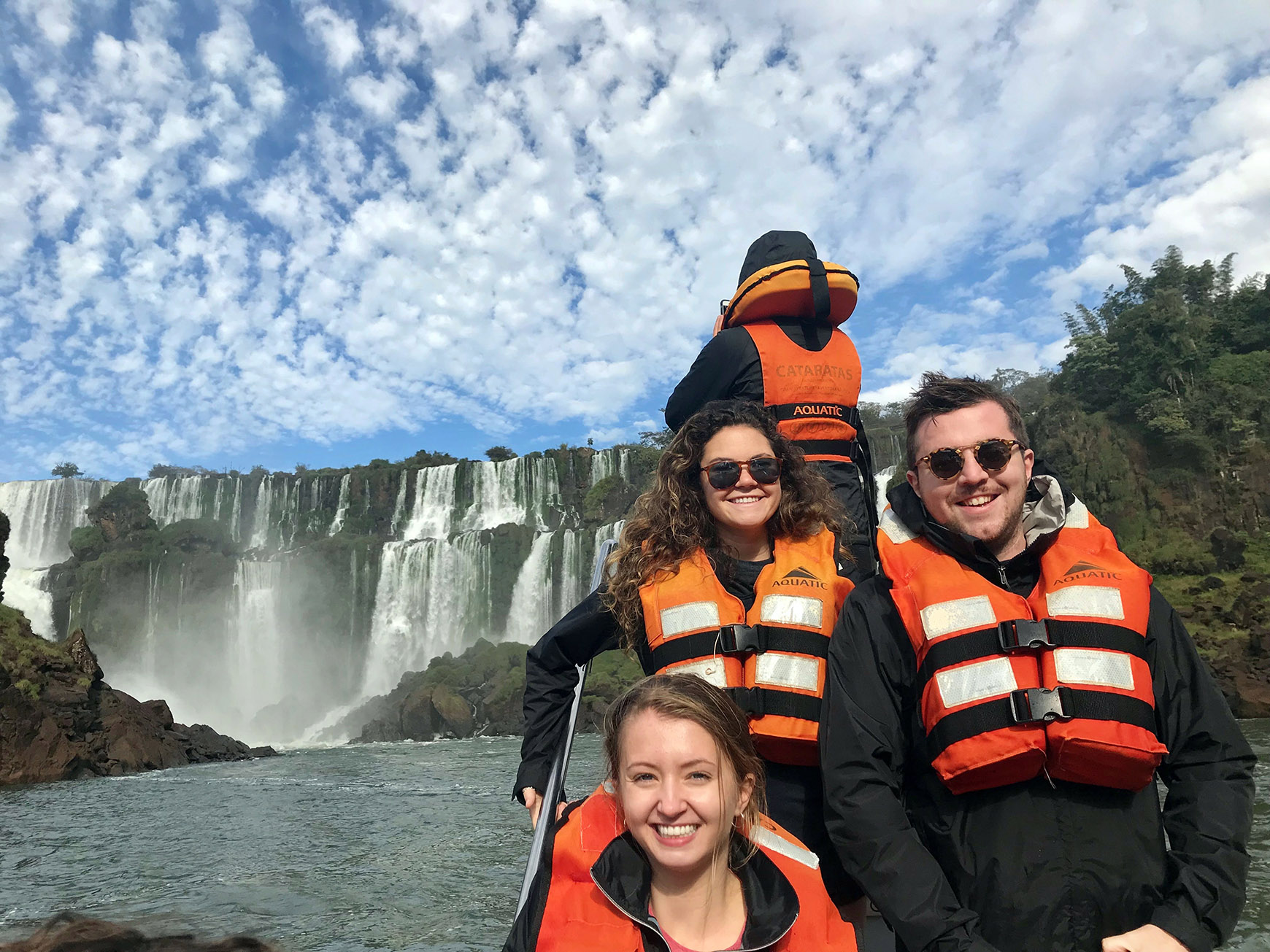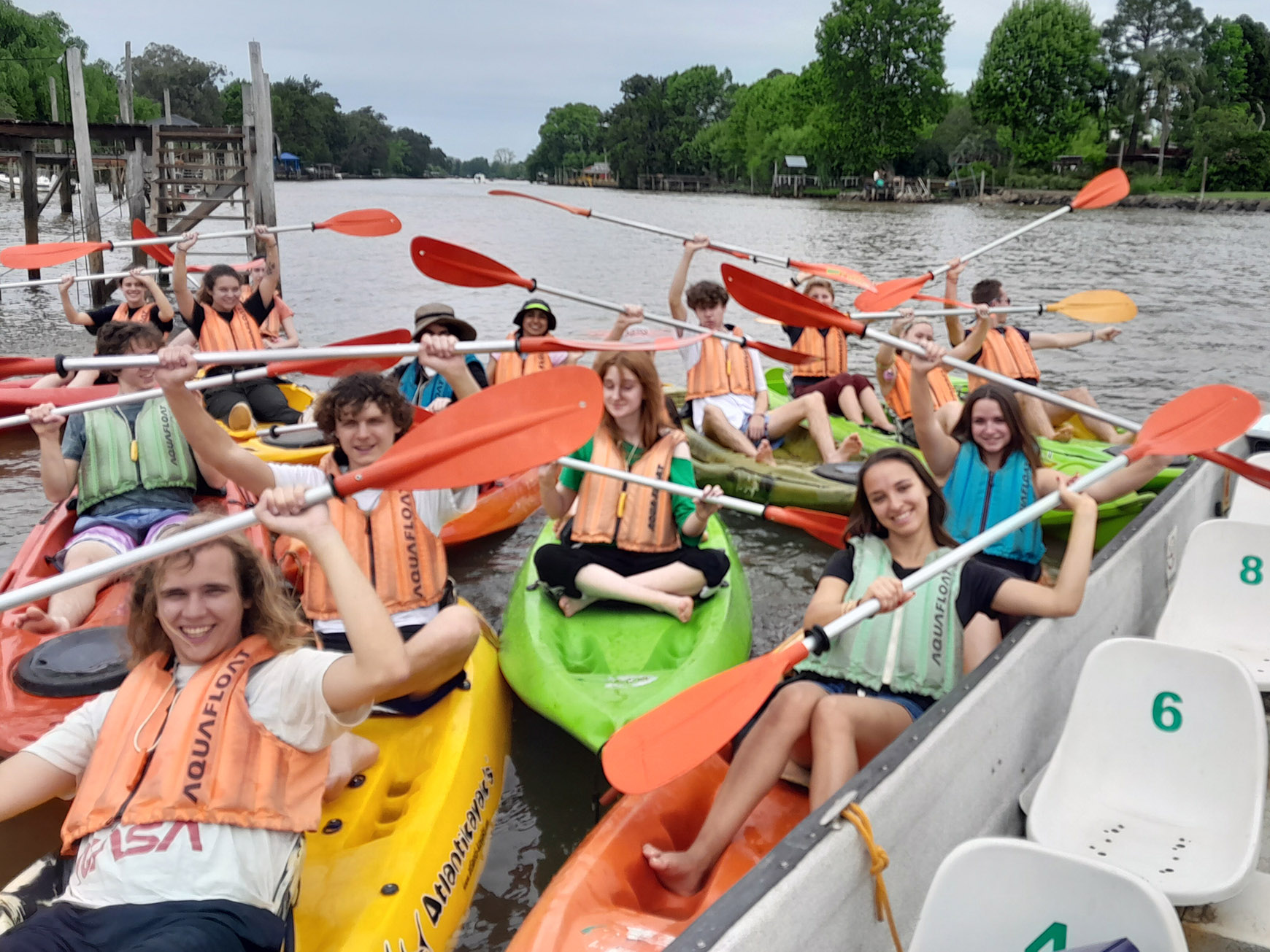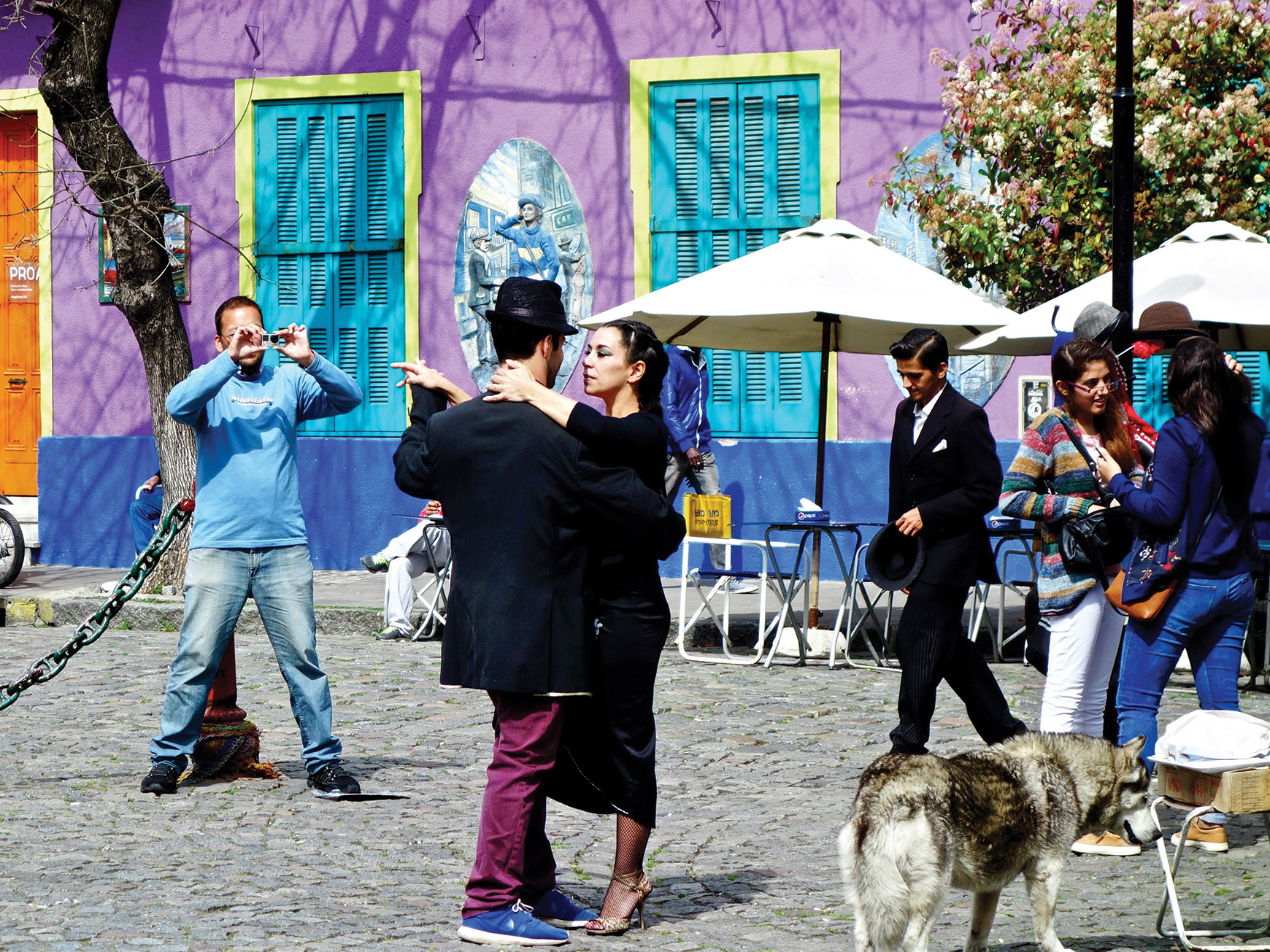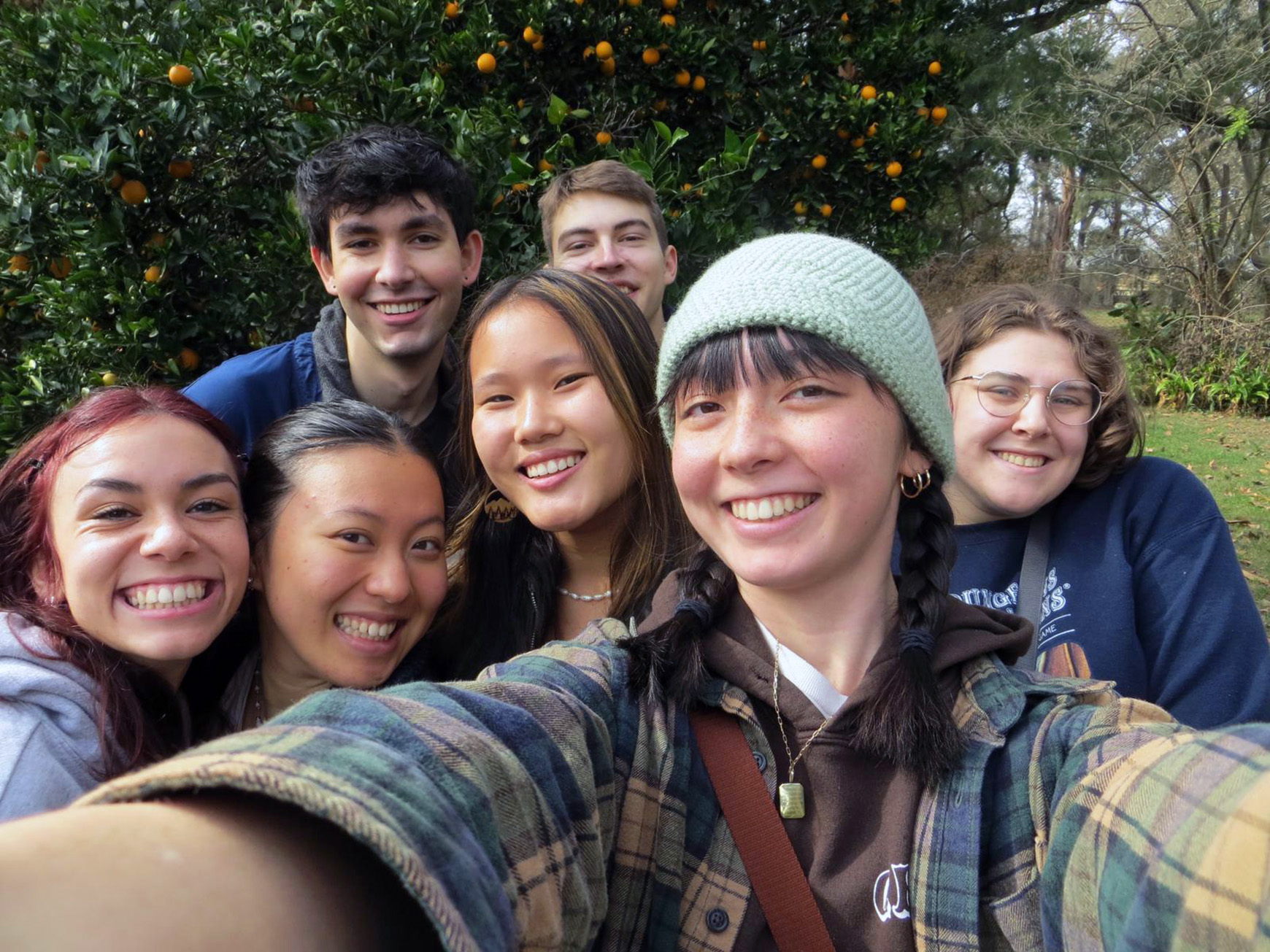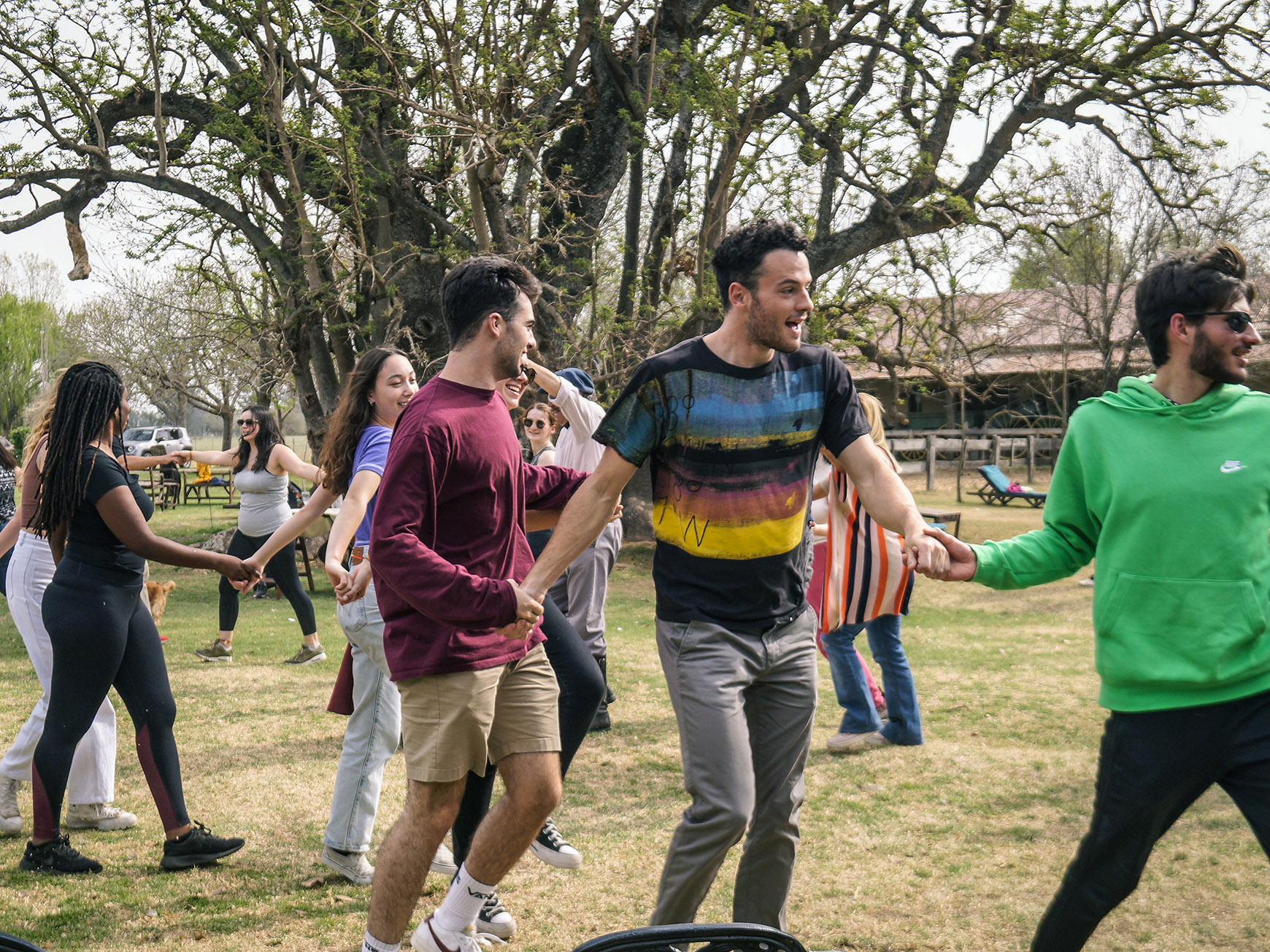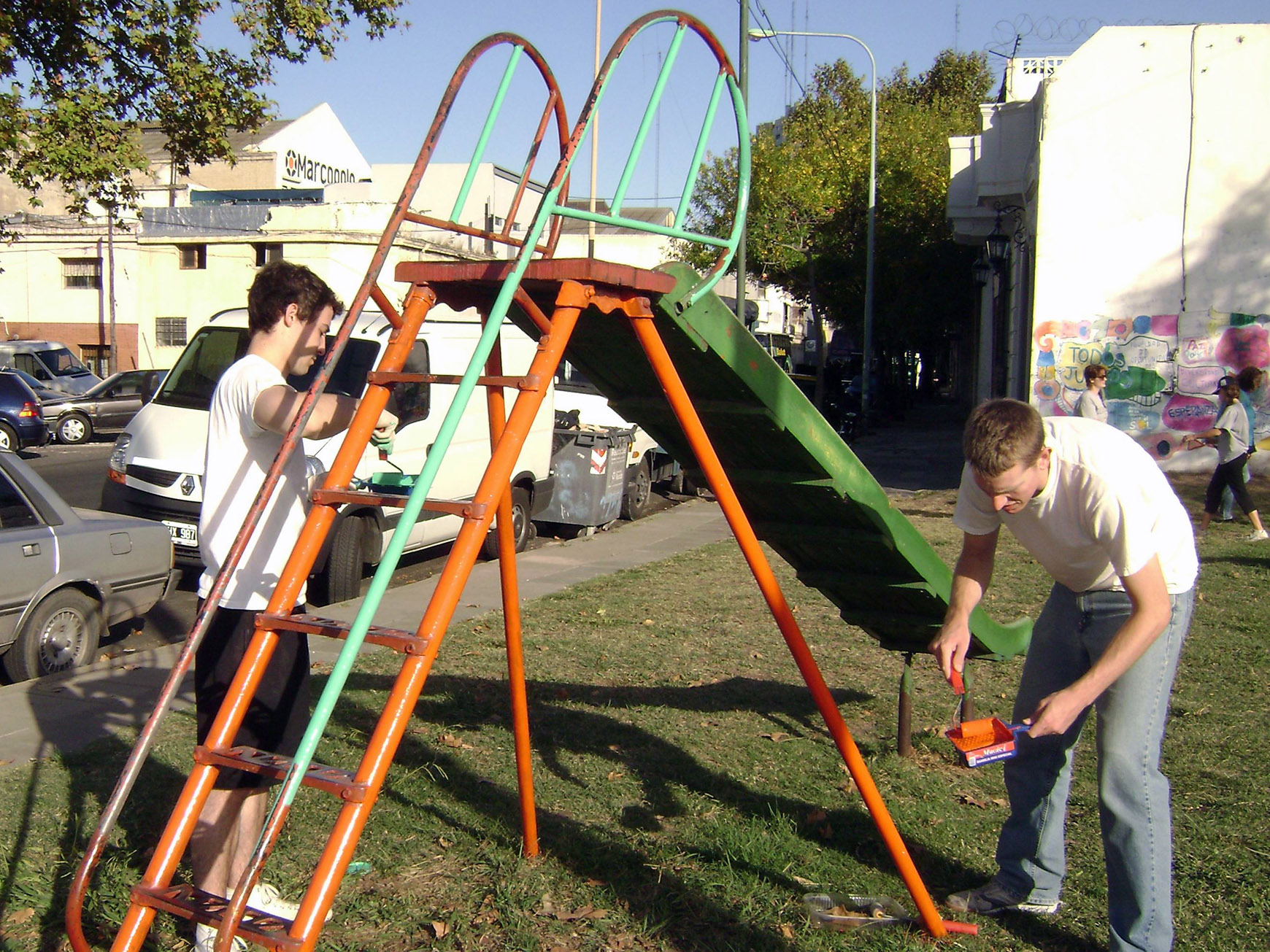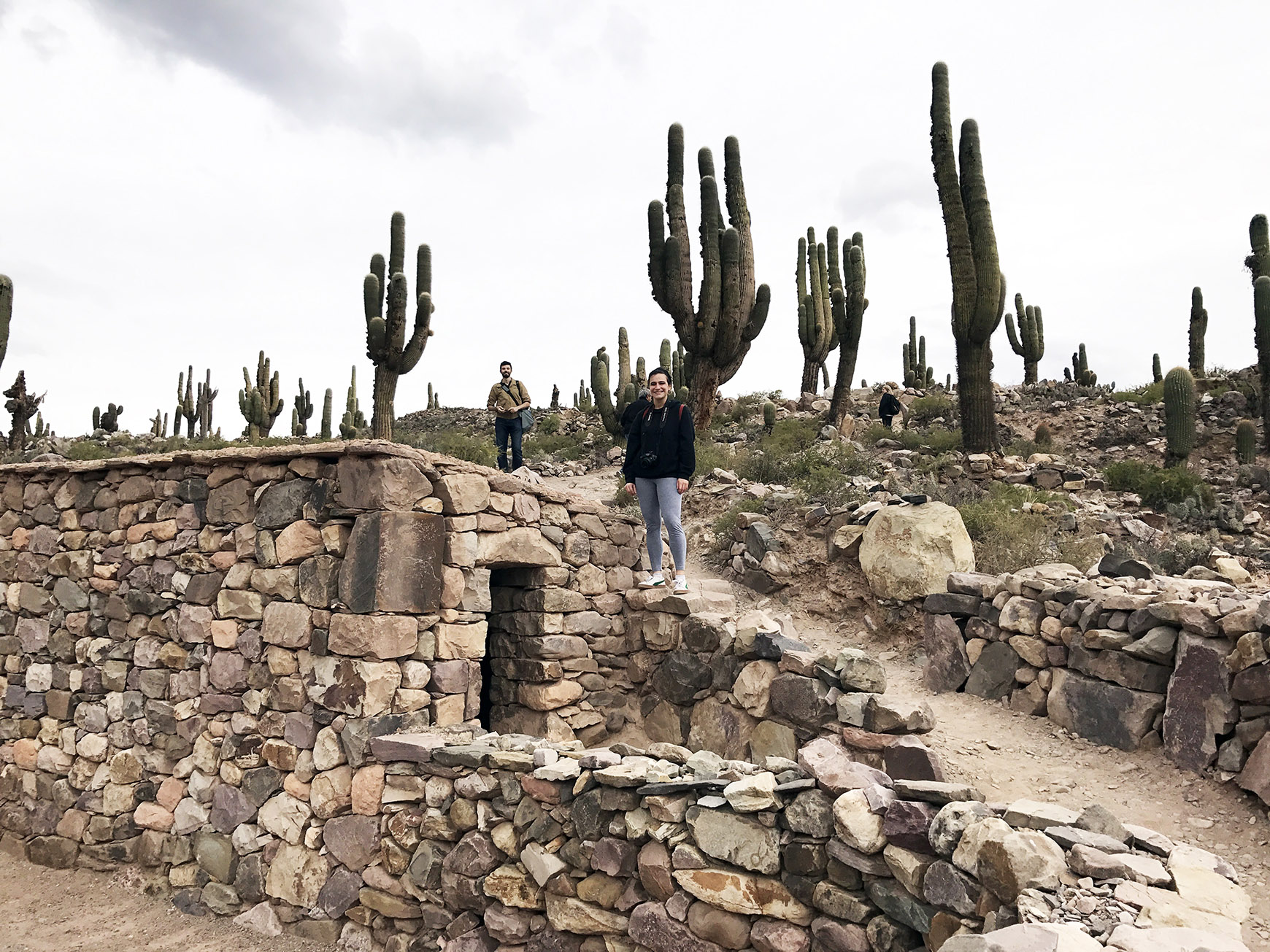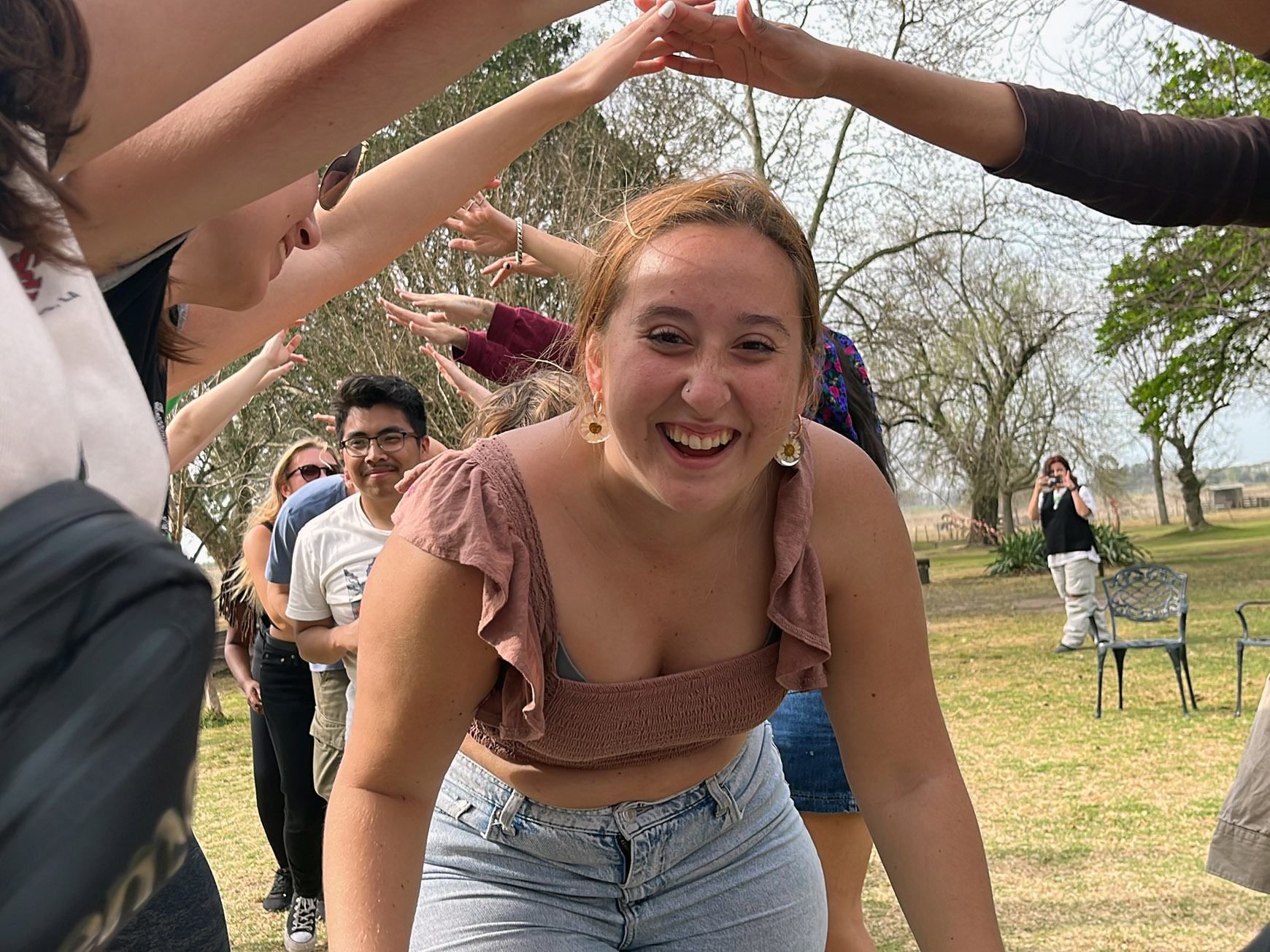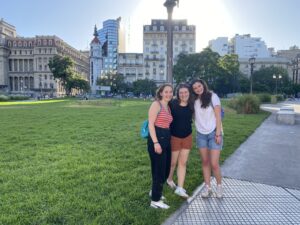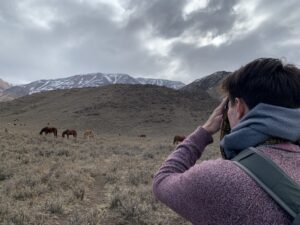Buenos Aires, Argentina
IFSA Study in Buenos Aires: Health Sciences


Program Overview
EXPLORE HEALTH THROUGH A NEW LENS IN ARGENTINA
Your semester in Argentina provides opportunities to develop a completely different perspective to health care approach and delivery firsthand, building knowledge on comparative systems of health, that can help you prepare for a rewarding career in public health, global health, health care policy, and more.
Choose to live in a homestay or modern apartment, and take classes in English at the IFSA Program Center in Buenos Aires. You’ll also have time to explore Buenos Aires, a city known for its dynamic cultural scene and fondness for late nights. We’ll help you learn essential language skills so you can savor empanadas and morcipán along the way.
Options for internships and volunteering help you gain insights and experience to guide your career path as you connect with porteños, port city dwellers.
Your program fee also covers unforgettable excursions and day trips. Explore amazing destinations like Colon, San Antonio de Areco, and Uribelarrea, and experience Argentine life and culture beyond Buenos Aires, with no added cost!
This is an exclusive IFSA-Designed Program. Learn more about these affordable programs here.
Additional options: IFSA Study in Buenos Aires, IFSA Study in Buenos Aires: Business and Economics, IFSA Study in Buenos Aires: Psychology and Neuroscience, and IFSA Study in Buenos Aires: Preveterinary Medicine.
Details at a Glance
Application deadline
Minimum GPA
2.00
Credit load
12–16
Housing
Apartment/Flat, Single Room Option, Homestay
Instruction language
English, Spanish
Language prerequisites
None. Four semesters of university-level Spanish or equivalent for internship or directed research options.
Visa required?
Yes. Learn More.
Academics
IFSA’s Study in Buenos Aires: Health Sciences program provides a compelling curriculum that’s taught in English and focuses on the health sciences and Spanish. Crafted for U.S. degree requirements and contemporary hot topics, you can select four to five IFSA classes for a total of 12-16 U.S. semester credit hours.
Classes may vary by semester based on faculty availability and student interest.
Health Sciences
Biostatistics for Public Health
Language of Instruction: English
This class provides a comprehensive introduction to the fundamental principles and applications of biostatistics in public health research and practice. Through a combination of theoretical instruction and hands-on practical exercises, students learn to analyze and interpret data relevant to public health issues. Topics include probability theory, sampling techniques, hypothesis testing, regression analysis, and the use of statistical software for data analysis. Emphasis is placed on the critical assessment of research findings, the design of epidemiological studies, and the application of biostatistical methods to address public health challenges. By the end of the class, students develop proficiency in using biostatistics to inform evidence-based decision-making and contribute to advancements in public health knowledge and practice. (3 U.S. semester credit hours)
Comparative Health Systems
Language of Instruction: English
This class explores the diverse landscape of existing healthcare systems in different countries and critically evaluates their structures, policies, and outcomes. Through comparative analysis, students will examine the strengths and weaknesses of healthcare models and systems, including single-payer systems, socialized medicine, and market-based approaches. This class will encompass issues of access, quality, cost containment, and equity in healthcare delivery, providing valuable insights into global health policy and practice. (3 U.S. semester credit hours)
Economics of Healthcare
Language of Instruction: English
This class offers a comprehensive examination of the economic principles that underpin various healthcare systems, including socialized healthcare, private insurance markets, and hybrid models. Through theoretical analysis, case studies, and comparative evaluations, students explore the financing, delivery, and regulation of healthcare services in different contexts. Topics include the role of government intervention, mechanisms for healthcare financing and reimbursement, cost-effectiveness analysis, and the impact of economic factors on healthcare access, quality, and equity. Special attention is given to understanding the strengths and weaknesses of different healthcare systems, including social health care models, and their implications for healthcare outcomes, patient satisfaction, and overall societal wellbeing. By critically analyzing real-world examples and policy debates, students develop a nuanced understanding of the complex interplay between economics, politics, and healthcare delivery systems. (3 U.S. semester credit hours)
Families and Global Health
Language of Instruction: English
This class explores the intersection of family dynamics and global health issues, with a focus on reproductive health, maternal and child health, and infectious disease prevention. This class examines the roles of families as agents of health promotion and disease prevention within their communities and explores cultural variations in family health beliefs and practices. Through case studies and guest lectures, students gain insights into the complex interplay between family dynamics, social determinants of health, and global health outcomes. (3 U.S. semester credit hours)
Introduction to Personal and Community Health
Language of Instruction: English
This introductory class provides a comprehensive exploration of key concepts, theories, and practices in personal and community health. Through an interdisciplinary lens, students examine the multifaceted determinants of health, including biological, psychological, social, environmental, and cultural factors. Topics covered include health promotion, disease prevention, lifestyle behaviors, healthcare access, and the social determinants of health disparities. Students will understand the impact of individual choices, community resources, and public policies on population health outcomes. Through interactive lectures, group discussions, and experiential learning activities, students explore strategies for promoting health and wellness at the individual, interpersonal, and community levels. Special emphasis is placed on addressing health inequities and advocating for health justice within diverse communities. By the end of the class, students develop critical thinking skills and practical tools to assess health risks, make informed decisions, and actively engage in efforts to improve personal and community wellbeing. (3 U.S. semester credit hours)
Medical Vocabulary
Language of Instruction: English
This class covers the roots, prefixes, and suffixes used in medical terminology, as well as common medical abbreviations and symbols. Through interactive exercises and medical case studies, students practice analyzing and interpreting medical terms in context and develop proficiency in communicating with healthcare professionals and patients. (3 U.S. semester credit hours)
Mental Health Psychology
Language of Instruction: English
This class explores the psychological dimensions of mental health and illness from a biopsychosocial lens. Class topics will include the classification of mental disorders, evidence-based treatments, and stigma reduction efforts. Through lectures, discussions, and experiential activities, students gain insight into the complexities of mental health issues and develop strategies for promoting psychological wellbeing in individuals and communities. (3 U.S. semester credit hours)
Spanish Language
Developing skills in a foreign language can profoundly impact your life personally and professionally. Though language study is not required, students frequently report their Spanish language class as one of their favorites and the one they applied most outside the classroom.
Essential Spanish
Language of Instruction: English and Spanish
If you’ve never studied Spanish before, you can take this optional, introductory class in Spanish language and Argentine culture. By introducing key words and phrases and venturing out into the city to practice them, you’ll gain essential skills to communicate effectively and navigate in a new culture. (1 U.S. semester credit hour)
Beginning to Advanced Spanish
Language of Instruction: Spanish
No prior language study is required. A mandatory prearrival language assessment will determine your appropriate language level.
- Beginning Spanish I (3 U.S. semester credit hours)
- Beginning Spanish II (3 U.S. semester credit hours)
- Intermediate Spanish I (3 U.S. semester credit hours)
- Intermediate Spanish II (3 U.S. semester credit hours)
- Advanced Spanish I (3 U.S. semester credit hours)
- Advanced Spanish II (3 U.S. semester credit hours)
Arts and Humanities
Argentina and Human Rights
Language of Instruction: English
The class comprises theoretical and practical contents of human rights and modernity. The main objective is to cover the historization of human rights, through an analysis of modernity and capitalism. It focuses on the history of human rights in Argentina from the independence revolutionary era to the return of the democratic government in the 1980s. Finally, the class reviews the experience of human rights in Argentina through two specific ways: The 1976 military coup, the detention camps, and the transition to democracy; Through the visit to communal memory spaces related to the systemic and institutional violation of human rights during the 1976-1983 military governments. (3 U.S. semester credit hours)
Argentina and Human Rights
Language of Instruction: Spanish
This class covers the same material as the English-taught version, described above.
Directed Research
Language of Instruction: Spanish
Directed research offers a unique opportunity to delve deeply into host context research projects. Students will be guided through projects that are both feasible in the study abroad context and relevant to their broader intellectual interests. The Directed Research class is structured through regular individual meetings with a faculty mentor to discuss the formation and execution of a research plan and, depending on the specific project, the possibility to conduct field or internet-based research. At the end of the term, students bring their research to fruition in the form of a paper and an oral presentation that meet recognized standards of scholarly work. The Directed Research class includes one-to-one faculty meetings, where students are taught essential components pertaining to research methodologies, ethical and safe research practices, and reflective practice. The faculty meetings aim to familiarize students with academic research theory, including framing a working hypothesis, qualitative and quantitative research methods, and evaluation and analysis of collected data. (3 U.S. semester credit hours)
Food, Culture, and Argentine Society
Language of Instruction: English
Understanding food’s role in culture, in society, is therefore a local and global concern. This class examines all of these issues from anthropological and sociological perspectives and draws on the rich culinary situation of the course in Buenos Aires throughout. Living in a time where food is no longer limited to home and restaurant kitchens, this course explores the place food has in a globalized world. (3 U.S. semester credit hours)
International Internship Seminar
Language of Instruction: English
All internships include participation in the International Internship Seminar, which covers 15 hours of online asynchronous Canvas modules to provide structured opportunities to reflect on the practical experience of the internship, learn more about your host country’s business culture, and further develop the professional skills needed for a successful transition from undergraduate coursework into a career or graduate school. Plus, you will engage with an online global cohort of IFSA internship participants, gaining exposure to business cultures around the world. While most internships placements are conducted in Spanish, limited English placements are available. (3 U.S. semester credit hours)
Sports and Identity in Argentina
Language of Instruction: English
This class draws on the approaches of anthropology, sociology, history, and other disciplines to bring new perspectives on some of the most popular sports in Argentina like soccer (“football”), rugby, and polo. What is the connection between cultural identity and the sports world? How do popular sports impact on nationalism in Argentina? Gender and equality in sports? We will examine how socio-cultural, political, and economic issues are understood in sporting terms and concepts: the hero; merit and sacrifice; individual identity and team identity, the vindication as society through sports victories and even the idea of sports as a path to social mobility. (3 U.S. semester credit hours)
Business and Economics
Business Ethics
Language of Instruction: English
This class delves into the core principles of ethics as they relate to the corporate landscape. Through a blend of theoretical exploration and practical case studies, students will examine the intricate ethical dilemmas faced by businesses and organizations. Emphasis will be placed on understanding the role of ethical leadership in fostering an environment conducive to ethical decision-making within the business realm. (3 U.S. semester credit hours)
Globalization and Economic Challenges in Latin America
Language of Instruction: English
Starting from economic changes in Latin America in the 1960s through future economic scenarios for Argentina in the 21st century, this class examines globalization’s historic impact as economies and financial systems become more interconnected. Supporting topics ranging from climate change, commercial conflicts, and strategic trade alliances with China, the U.S., and other regions, a series of field visits allow students to gain firsthand experience with the economic challenges and opportunities globalization presents in and around Buenos Aires. (3 U.S. semester credit hours)
Intercultural Communication for the Global Workplace
Language of Instruction: English
This class is designed to improve your ability to communicate effectively with people from diverse cultural backgrounds. As much as anything, this is a class in personal development designed to prepare you to study and work successfully domestically and abroad with people from every part of the world. Success is a function of your ability to communicate across cultures, build cultural intelligence, and global dexterity. Critical skills include your ability to decode the context, understand yourself, and to respond creatively. Utilizing intercultural theory, we will explore the complexity of culture through paradox, stereotypes, verbal and non-verbal communication, personal beliefs and values, and strategies for building cultural intelligence and adaptability. Examination of work environments, professional practices, and business etiquette will be an important and underpinning feature of the class. Local guest speakers representing such areas as multicultural team leadership and international young professionals will augment your learning. At all times, theoretical learning will be linked to personal experiences and perspectives. While this class is likely to contribute to a positive study abroad experience; in the long term, the aim is to enhance your effectiveness in multi-cultural organizations whether domestically or abroad. (3 U.S. semester credit hours)
International Finance
Language of Instruction: English
This class delves into advanced concepts and strategies in international finance, offering students a deeper understanding of global financial markets and transactions. Topics include the analysis of exchange rate mechanisms, currency risk management strategies, international investment evaluation, multinational capital budgeting, and the complexities of international financial institutions. Through case studies, simulations, and hands-on projects, students will develop practical skills in navigating the intricacies of international finance and gain insights into the strategic decision-making processes of multinational corporations operating in the global marketplace. (3 U.S. semester credit hours)
International Political Economy
Language of Instruction: English
This class explores theoretical issues and illustrative case studies related to international political economy. Students examine ways domestic and international politics affect relations between states by examining the role of government in the production, distribution, and consumption of resources. Students also learn to apply core concepts and theories in international political economy to case materials. (3 U.S. semester credit hours)
International Trade
Language of Instruction: English
This class gives students the conceptual basis and the necessary tools for understanding modern international trade at the intermediate level. Topics include gains from trade in a classical world; the modern theory of international trade; factor price equalization; empirical tests and extensions of the pure theory model; economic growth and international trade; the nature and effects of protection; motives and welfare effects of factor movements. Each topic will be followed with examples and case studies mainly under the context of Argentina’s international trade with the U.S., China, and the rest of the world. (3 U.S. semester credit hours)
Operations and Supply Chain Management
Language of Instruction: English
This class introduces business operation and supply chain management. Both operations and supply chain management are the primary functions of every company and organization. In this age of rapid globalization and fast-moving information, operations and supply chain management are the keys to improving company profitability and sustainability. It is crucial for the success of a company and its customers; therefore no one should underestimate its importance. Through lectures, case studies, and group discussion students explore the major topics in business operation as well as supply chain management. Students will not only learn the important subjects of operation and supply chain management, but also review actual case studies of leading global companies. The class is structured to cover the total value chain of operations and supply chain in this dynamic economic environment. (3 U.S. semester credit hours)
Strategic Communications in Business
Language of Instruction: English
Communication plays a fundamental role in all facets of business, regardless of industry. This class challenges students to explore leadership styles and leverage their strengths to communicate clearly and strategically in a variety of settings and to a range of internal and external audiences. Students will study and practice effective written and oral internal communication strategies proven to improve morale, inspire innovation and increase productivity. Similarly, students will study strategic communications theories to produce sound, integrated external communications across platforms. Students will gain the skills to identify and communicate effectively with audiences; develop goals, metrics, and tactics for lasting, meaningful outcomes; and draft clear, consistent, and correct business communications. The class will also explore emerging trends, active listening, conflict communication, ethics, diversity, and business etiquette. (3 U.S. semester credit hours)
Preveterinary Medicine (Coming Spring 2026)
Animal Genetics
Language of Instruction: English
This class provides a comprehensive introduction to the principles of genetics as they apply to veterinary medicine, with a focus on both companion and production animals. Students will explore the molecular basis of inheritance, genetic variation, and the application of genomics in animal breeding, disease management, and conservation. Special emphasis will be placed on genetic engineering in Argentina, highlighting region-specific breeding practices and genetic challenges. Through lectures, case studies, guest lectures, and field visits to breeding, students will gain both theoretical knowledge and practical experience in veterinary genetics. (3 U.S. semester credit hours)
Animal Management
Language of Instruction: English
This class introduces students to fundamental concepts in animal management, emphasizing welfare, husbandry, health, and sustainable practices for both farm and companion animals. Through a combination of lectures, case studies, field visits, and guest speakers, students will explore the biological, ethical, and environmental aspects of animal management, focusing on species relevant to Argentina and Latin America. The class also examines the influence of consumer attitudes, local culture, and regulations on animal welfare and management practices. Students will gain practical knowledge in animal behavior, nutrition, breeding, and disease prevention, with a special emphasis on sustainable and ethical livestock management in diverse agricultural systems. (3 U.S. semester credit hours)
Animal Nutrition
Language of Instruction: English
This class is specifically designed for students aiming to gain practical knowledge and hands-on experience on general aspects of animal nutrition while immersing in the culture and agricultural practices of Argentina. Students will have the opportunity to compare the similarities and differences between domestic animal management practices between the U.S. and Argentina. Through lectures, field visits, and interactive discussions, students will be able to expand their knowledge on a variety of nutrition-related topics, and gain both theoretical knowledge and practical insights to better understand and address the challenges of animal nutrition in a global context. (3 U.S. semester credit hours)
Animal Population Health
Language of Instruction: English
This class focuses on the health management of animal populations in various ecological and production systems, emphasizing epidemiology, disease surveillance, and public health. Through lectures, case studies, guest lectures, and field visits in Buenos Aires, students will explore how environmental, economic, and cultural factors impact animal health. Students will delve into One Health principles, examining the interconnectedness of animal, human, and environmental health, with a focus on zoonotic diseases, disease prevention, and public health initiatives in Argentina. Students will gain practical skills in population-level disease control, outbreak investigation, and health monitoring across diverse species, from livestock to wildlife. (3 U.S. semester credit hours)
International Veterinary Medicine
Language of Instruction: English
This class explores global veterinary medicine practices, challenges, and innovations. It emphasizes the role of veterinarians in global public health, zoonotic disease management, food security, international regulatory frameworks, and equine medicine and ethology. Students will develop competencies in understanding cultural, ethical, and economic aspects of veterinary medicine on an international scale. (3 U.S. semester credits)
Livestock Agribusiness Management
Language of Instruction: English
This course is designed to go beyond the classroom and explore the principles of effective animal management with a focus on animal production systems in Argentina and its unique challenges and opportunities. Students will develop a comprehensive understanding of managing facilities, people, animals, and monitor progress, and performance within the livestock industry. The class emphasizes the importance of aligning management practices with sustainable agriculture, environmental regulations and animal welfare to meet global consumer demands. The class offers a unique opportunity to explore the diverse management practices, cultural influences, and global challenges in animal production. Through a combination of lectures, case studies, and field trips, students will examine critical aspects of management, including team building and leadership, farm personnel training, cultural considerations, decision-making based on key performance indicators, and the use of technology to optimize farm management. (3 U.S. semester credit hours)
Veterinary Spanish
Language of Instruction: English and Spanish
Veterinary terminology refers to the specialized language used to describe the components and processes of animals, veterinary procedures, diseases, disorders, and pharmacology. Simply put, it is the vocabulary that veterinary professionals use to describe animals, their conditions, diseases, and the treatments they prescribe. In this class, students will also explore the use of Spanish terminology utilized by professionals in this field, with the aim of providing an intercultural perspective. (3 U.S. semester credit hours)
Psychology and Neuroscience
Brain, Drugs, and Addiction
Language of Instruction: English
This class examines substance use and its impact on how the brain functions from the perspective of neuropsychology. The concept of drugs, normal brain functioning, and the impact of their consumption at the neuroanatomical and neurophysiological levels will be analyzed. Students will address social, psychological, cultural, and biological aspects that are linked to the deterioration of the nervous system, as well as the differences between occasional use, problematic use, and addiction. Finally, a comparison will be made in the substance use and its impact approach between Argentina and the U.S. (3 U.S. semester credit hours)
Cognitive Neuroscience Foundations
Language of Instruction: English
Students will explore the cognitive systems of neuroscience, which encompass various aspects such as attention, pattern recognition, knowledge representation, language, reasoning, and human intelligence. Through this exploration, students will understand how these systems enable humans to sense, perceive, act, learn, think, and remember the host context and the broader world. (3 U.S. semester credit hours)
Intervention Strategies in Mental Health
Language of Instruction: English
This class covers strategies of intervention in mental health. Some psychologists in Argentina have defined “mental health” as a comprehensive and inclusive state of actions capable of producing welfare rooted in the insertion of the individual in their functional milieu. Together students learn about mental health, intervention, and effective strategies, while exploring the applications across diverse situations and populations. Identifying effective preventive and therapeutic strategies is crucial to establishing public policies which contribute to mental well-being at individual, family, community, and social levels. (3 U.S. semester credit hours)
Multicultural Psychology
Language of Instruction: English
This class will examine how “cultural traditions and social practices regulate, express, and transform the human psyche, resulting less in psychic unity for humankind than in ethnic divergences in mind, self, and emotion” (Shweder, 1991, p. 91). It will explore how psychology is socially constructed and will pay particular attention to the following factors as they influence human development: oppression, language, acculturation, economic concerns, racism and prejudice, sociopolitical factors, child-rearing practices, religious practices, family structure and dynamics, and cultural values and attitudes. We will explore the meaning of culture and how it affects our thoughts and behavior. (3 U.S. semester credit hours)
Psychology of Crime and Justice
Language of Instruction: English
This class will introduce a broad range of theoretical and methodological approaches to psychology, crime, and justice. It will explore sources of individual variation in criminal conduct from a psychological perspective. Students will examine the factors that influence violent criminals, such as the environment, mental disorders, and personality. Topics will focus on associations between criminality and genetics, brain functioning, psychophysiology, mental disorders, personality and moral development, and social learning. Through the study of a broad range of topics within the discipline of psychology, including the application of psychological knowledge in the study of crime and justice, students will learn to appreciate how the subject progresses through the careful use of research methods. (3 U.S. semester credit hours)
Social Cognition and Neuroscience
Language of Instruction: English
Integrating insights from cognitive psychology, social cognition, and cognitive neuroscience, this class explores how we understand other people’s behavior. Students will examine the organization of the brain and its functions from a descriptive dimension, as well as from a global and systemic perspective to understand how we construct social cognitions and their effect on behavior and social interaction. Intending to make the theoretical contents easily understandable, the topics will be approached from practical examples, both from the local culture (e.g., fútbol, mate) and from global social examples (e.g., the Holocaust, bullying). (3 U.S. semester credit hours)
Language Requirement
To participate in an internship or directed research, you must have a specific language level. Please visit our Language Requirements page for more details. If you have questions about whether you qualify, contact your IFSA Enrollment Counselor.
DIRECTED RESEARCH
Engage in individualized field research with faculty experts on a contemporary issue of interest. Regular meetings with faculty will assist in the formation and execution of research plans, and they will guide you on how to thoughtfully and critically integrate academic research with experiential learning. You will sharpen your written and oral communication skills through the development of articulate and comprehensive research that is respectful to the sensitivities of the local culture.
If you chose to research live human subjects, live animals or another topic that is deemed by IFSA to be required to be reviewed by the Institutional Research Board (IRB) at your home institution, then you will have to file your project with your home institution’s IRB board and submit your result to IFSA. Your IFSA Enrollment Counselor will review your application materials to help determine if you must file with IRB.
Research opportunities are conducted in Spanish. For more detailed information and examples of previous student placements, contact your IFSA Enrollment Counselor.
VOLUNTEERING
The IFSA Buenos Aires Program Center organizes non-credit bearing volunteer opportunities throughout the semester, usually as one-time activities or events. On occasion, more sustained involvement may be possible. Opportunities vary, but may include agricultural work on an organic farm, assisting students through tutoring or playing games designed to build social skills, or providing services for the homeless population or LGBTQ+ community in Buenos Aires.
INTERNSHIPS
IFSA internships include real-world work experience, along with developing intercultural skills and experiences that are key to personal, academic, and professional success. Expect to devote a total of 120 hours working with your host organization, with supervision from your seminar instructor, coordinated by on-site IFSA team members. In addition, interns complete the International Internship Seminar for 3 U.S. semester credit hours. Internships are not remunerated.
Students have interned at NGOs, local corporations, and government organizations in Buenos Aires.
Your goals are carefully considered, tailoring the placement process to ensure the best possible fit. Keep in mind that final placements depend on your skills (including your Spanish language abilities), prior experience, and availability. Although every effort is made to match your placement with your preferred field or area of business, it can’t be guaranteed. While most internships placements are conducted in Spanish, limited English placements are available.
Application. After you submit your application, resume, and IFSA Internship Interest Form, an IFSA Enrollment Counselor and an on-site IFSA Team member will work with you to identify your professional strengths, review your goals, and refine your internship interests to establish a match. From there, you’ll have an interview in Buenos Aires with your potential internship host. You will be provided with tips and resources to prepare for your interview.
Sample Placements. The following are examples of internships IFSA students have recently completed. Placement options vary from term to term.
- Plan and implement initiatives to improve the living conditions of vulnerable groups
- Prepare proposals for media campaigns and meetings to elevate awareness on violence against women and the LGBTQ+ community
- Examine and source historical archives on humanitarian crimes to raise awareness and support human rights
- Assist and support differently abled children through educational and recreational activities
- Participate in projects focused on eliminating the gender gap in social, political and economic arenas
- Coordinate interactive activities to strengthen the relationship between the immigrant and local community, and society at large
New country, new way of learning!
Here’s what to expect at IFSA Study in Buenos Aires:
- More emphasis on independent learning. More self-directed learning outside of class.
- Locate the syllabi for IFSA classes on our program page to understand assignments and class requirements.
- Grade inflation and curving are uncommon; fewer students get exceptional grades.
- Strong focus on critical analysis with supporting resources documented.
- Students cannot audit courses.
- IFSA local staff are also available for individual help and provide tutoring.
- More information can be found in the IFSA Student Portal under Resources – Helpful Documents and Links and Academics.
APPLICATION REQUIREMENTS
Eligibility
- You must be at least 18 years of age. Students under 18 may be accepted on a case-by-case basis.
- You must be currently attending or recently graduated from a U.S. or Canadian community college, technical college, two-year college, four-year college, or four-year university.
- You must have completed at least one (1) full-time semester of study at your home institution before the beginning of the term.
Recommendation Letter
Not required. A directed research or internship site may request a reference letter before placement is finalized.
Language Requirement
No requirement.
TRANSCRIPT
Upon completion of your program, IFSA will send an official Butler University transcript to your home university with your coursework converted to the U.S. semester credit hour system. You will also have access to an unofficial transcript in your IFSA Student Portal. The transcript reflects classes taken, credits attempted, and grades earned during your term abroad. This service is included in your study abroad program at no additional cost. See our Transcripts page for more information.
Excursions
Activities and excursions are designed to pull you into the communities you visit and encourage cultural connections of every kind. There’s no extra fee to participate in these optional outings—everything is included in your program fee.
Below are a selection of activities and excursions from previous terms; options may vary for your program. Due to the seasonal nature of many of program activities, we cannot guarantee a specific activity or excursion will be available in a given term or program.
Sample Activities
- Tango Class: Immerse yourself in the passionate rhythms of Buenos Aires with a professional tango class. Learn the basics of this iconic dance and experience the vibrant culture firsthand.
- Visit to MAMBA: Explore contemporary art at the Museo de Arte Moderno de Buenos Aires (MAMBA). Discover innovative exhibitions and gain insights into Argentina’s modern art scene.
- Football Match: Feel the excitement of Argentine football! Attend a live match and experience the electric atmosphere of the stadium, cheering alongside passionate local fans.
- Movie at Gaumont: Enjoy a classic or contemporary Argentine film at the historic Gaumont Cinema. Dive into the local film culture and enjoy a unique cinematic experience.
Sample Excursions:
- 2-Night Trip to Salta & Jujuy: Embark on an unforgettable journey to the stunning northwest of Argentina. Visit the breathtaking salt flats, explore the colorful Quebrada de Humahuaca, and enjoy the charming vineyards of Cafayate.
- Estancia Day at Estancia La Mimosa: Experience the traditional Argentine countryside with a day at Estancia La Mimosa in Exaltación de la Cruz. Enjoy horseback riding, savor a delicious asado (barbecue), and immerse yourself in the tranquil rural lifestyle.
Housing and Meals
Housing
Apartment/Flat, Single Room Option, HomestayMeals
Most Included;Self-CateringDetails
Buenos Aires students can opt for a homestay with a local family or—for an additional fee—live in city apartments. Both options allow you to experience the lifestyle of this amazing city.
- Homestays provide opportunity for additional support and connection as you get to know your hosts.
- Apartment living allows you to soak up local culture, practice Spanish language skills, and connect with city residents. This is a great choice for adventurous or independent students.
HOMESTAYS
We place students with carefully screened families in safe neighborhoods, with up to two IFSA students per family. Many families have been hosting IFSA students for years. Often, they enjoy having young people around, as their adult children have left home. You might live with a retired couple or a retired woman, perhaps with visits from young grandchildren. Your hosts might have high school-age children and a grandparent living with them. Or you might join a single mom who shares her home with her young daughter, with another adult child living nearby.
- Location. Typically in the Recoleta, Palermo, Belgrano, Villa Crespo, Almagro, and Caballito neighborhoods for easy access to public transportation, the IFSA Program Center, universities, shops and cafes.
- Supplemental fee? No.
- Commute. Whether on foot or via bus or metro, your travel time to the IFSA Program Center is more than 40 minutes. Travel times to universities are as follows:
- University of Buenos Aires, Philosophy and Letters: No more than 60 minutes
- University of Buenos Aires, Social Sciences: No more than 50 minutes
- University of Salvador: No more than 35 minutes
- Torcuato Di Tella University: No more than 60 minutes
- Living space. Only a few hosts have houses; many live in apartments. Expect to have your own bedroom, though it will likely be smaller than a typical U.S. space. Students share a bathroom with other family members. Your host will provide a desk or other suitable place to study.
- Language. Few families are fluent in English, but most can communicate. We do our best to place students without Spanish skills with English-speaking families.
- Meals. Two meals a day included. Students occasionally eat out with friends and buy snacks independently. Hosts appreciate advance notice if you will not be present for breakfast or dinner.
- Other details. Your host will give you access to laundry facilities once a week. Keep in mind that washing machines tend to have smaller capacity than in the U.S.
APARTMENTS
Live in a modern, furnished studio apartment selected by IFSA in the residential Belgrano neighborhood or downtown. In both cases, building residents include a mix of university students and visiting professionals. Belgrano housing costs are covered in your program fee; downtown apartments include a supplemental fee to cover the higher cost.
Belgrano neighborhood. Primarily residential, quieter than downtown.
- Location: Cuba 2290
- Supplemental fee? No.
- Living space: Studios include a bedroom and bathroom with kitchen/living space. Bedding, linens, towels, and basic kitchenware provided.
- Meals: No meals provided. Students prepare or purchase their own food.
- Other details: WiFi included. Studios are cleaned weekly. 24/7 security. Staff available from 7 a.m.–midnight. Laundry facilities on-site. Shared study space.
- Commute: Metro and bus stop are two blocks away. Travel times:
- IFSA Program Center: 30 minutes by subway
- University of Buenos Aires, Philosophy and Letters: 50 minutes by bus
- University of Buenos Aires, Social Sciences: 45 minutes by bus
- University of Salvador: 30 minutes by bus
- Torcuato Di Tella University: 25 minutes on foot
- Nearby: Restaurants at vibrant Pasaje Echeverría. Bustling Barrio Chino with Asian shops and kitchens. Picturesque greenspace at Plaza Barrancas de Belgrano.
Downtown. Convenience and cultural icons.
- Location: Esmerlda 920
- Supplemental fee? Yes. Please see Dates and Fees section.
- Living space: Studios include a bedroom and bathroom with kitchen/living space. Bedding, linens, towels, and basic kitchenware provided.
- Meals: No meals provided. Students prepare or purchase their own food.
- Other details: WiFi included. Studios are cleaned weekly. 24/7 security. Staff available from 7 a.m.–midnight. Laundry facilities on-site. Shared study space. Gym and pool.
- Commute: Metro and bus stop are two blocks away. Travel times:
- IFSA Program Center: 14 minutes on foot
- University of Buenos Aires, Philosophy and Letters: 15 minutes by bus
- University of Buenos Aires, Social Sciences: 20 minutes by bus
- University of Salvador: 15 minutes by bus
- Torcuato Di Tella University: 60 minutes by bus
- Nearby: Plaza General San Martín, a beautiful, historic square. Iconic Colon Theatre, home of world-class performances. Palace of the Argentine National Congress. The Pink House, Argentina’s presidential palace. Avenida Corrientes, a.k.a. The Avenue, a lively street known for restaurants and theaters.
Dates and Fees
Get Started
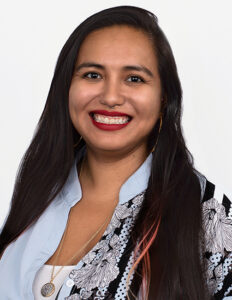
Selena Rincon
Senior Enrollment Counselor
